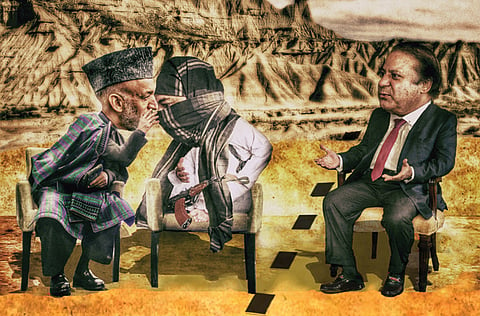Karzai-Taliban deal might be best for Afghanistan
The president’s struggle to save his own skin is probably the best chance of helping the people save theirs

The Obama administration is shocked — shocked! — that Afghan President Hamid Karzai was secretly negotiating with the Taliban. The previously undisclosed negotiations certainly explain what White House adviser John Podesta recently called Karzai’s “erratic” behaviour in refusing to negotiate an agreement to keep US forces in the country after 2014.
But what, exactly, is so terrible about Karzai negotiating separately with the same Taliban that the United States has repeatedly tried and failed to engage? In fact, although the Taliban are very likely playing the outgoing president, he is exactly the person who should be trying to negotiate an entrance to Afghan politics for the Taliban that would not involve mass killings of people who sided with the US. No doubt Karzai is trying to save his own skin. But there is at least a chance he could save the lives of many other Afghans, too.
The place to begin an analysis of Karzai’s efforts is with a clear-eyed account of the US strategic position in Afghanistan relative to the Taliban. North Atlantic Treaty Organisation troops have not lost their fight against the group. But neither has Nato won — and in a war of attrition, which the Afghan conflict has been for 12 1/2 years, this failure to win counts as a species of defeat. The Obama administration has sought to redefine its goals in Afghanistan as fighting Al Qaida. But this does not change the fact that the overwhelming majority of the US’s energy during most of this long war has been spent on the Taliban and their allies.
As the US draws down its troops, whether to 10,000 or to zero, the Taliban will no longer be facing the most technologically advanced army on Earth. They will be facing several hundred thousand newly trained Afghan troops, whose morale is uncertain and whose battle readiness is at best variable. Perhaps the Afghan army can continue an effective counterinsurgency for years, perhaps for months. Much depends on the extent of US support. Either way, the Taliban can wait out the US, as they have from the start. Eventually, the Afghan government will either have to reach an accommodation with the Taliban or be defeated by them. The Obama administration acknowledged as much as it unsuccessfully sought to negotiate with the Taliban itself, efforts suspended most recently in June 2013.
Enter Karzai, who has publicly criticised US-Taliban talks and refused to join them. Karzai understands perfectly well that the Afghan alliance with the US is a diminishing asset as it moves closer to withdrawal. Under the Afghan Constitution, he may not serve another term, so if the US remains the power behind the throne, he will have to step down in the spring. That would leave him the choice of remaining in Afghanistan, vulnerable to revenge killing by the Taliban, or going into powerless exile from the country he has led for a decade.
Figurehead leader
The main thing that Karzai has to offer the Taliban is the chance to take over the government without much of a fight. What he would seek in return is, presumably, that his own life be spared, and perhaps that he be given some degree of respect and importance, maybe even some sort of a formal role in a future Taliban-controlled government. Perhaps Karzai believes he has a chance to become the Taliban’s figurehead president. That would help the Taliban solve the problem of international legitimacy. And he has years of experience as a front man for the Americans. The Taliban may see the benefits of participating in the international community, an aspiration they did not seriously entertain when they ruled Afghanistan from 1996 to 2001.
The odds are that the Taliban are stringing Karzai along, just as they have strung along the US by proffering the possibility of negotiations only to resume violence. But what of it? Assume the Taliban are playing their usual long game; neither Karzai nor the Americans are any worse off negotiating with them than not negotiating.
And Karzai’s efforts have a potential upside that the US negotiations lack. For Karzai’s life to be spared and his presence to be tolerated would be a powerful signal to Afghans who allied themselves with the US that Taliban rule will not come with vicious retaliation. The Taliban right now must be asking themselves whether to engage in de-Americanisation in a post-conflict Afghanistan. A glance at US efforts to de-Baathify Iraq, which led to bloodshed and chaos, may be all it takes for them to conclude that the benefits are not worth the costs. Why resort to a reign of terror if the people are already willing to accept your rule?
Perhaps the deepest ethical obligation Americans face in leaving Afghanistan is to those Afghans who, at great personal risk and sacrifice, stood beside the US during its years as invader, occupier and defender of their country. They are the people most gravely at risk after a Taliban takeover. For better or worse, the best-known of these people is the flawed and human Karzai. His struggle to save his own skin is probably the best chance of helping them save theirs.
— Washington Post
Noah Feldman, a Law professor at Harvard University and the author of Cool War: The Future of Global Competition, is a Bloomberg View columnist. Follow him on Twitter at@NoahRFeldman.
Sign up for the Daily Briefing
Get the latest news and updates straight to your inbox



